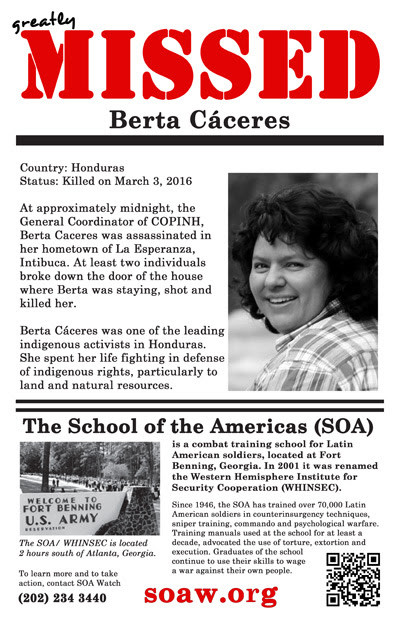

At approximately 11:45 p.m. last night (March 2), the general coordinator of COPINH [Consejo Cívico de Organizaciones Populares e Indígenas de Honduras], Berta Cáceres, was assassinated in her hometown of La Esperanza, Intibuca. At least two individuals broke down the door of the house where Berta was staying for the evening in the Residencial La Líbano, shot and killed her. COPINH is urgently responding to this tragic situation.
Berta Cáceres is one of the leading Indigenous activists in Honduras. She spent her life fighting in defense of Indigenous rights, particularly to land and natural resources.
Cáceres, a Lenca woman, grew up during the violence that swept through Central America in the 1980s. Her mother, a midwife and social activist, took in and cared for refugees from El Salvador, teaching her young children the value of standing up for disenfranchised people.
Cáceres grew up to become a student activist and, in 1993, she co-founded the National Council of Popular and Indigenous Organizations of Honduras (COPINH) to address the growing threats posed to Lenca communities by illegal logging, to fight for their territorial rights and to improve their livelihoods.
Berta Cáceres and COPINH have been accompanying various land struggles throughout western Honduras. In the last few weeks, violence and repression towards Berta Cáceres, COPINH and the communities they support, had escalated. In Río Blanco on Feb. 20, Berta Cáceres, COPINH, and the community of Río Blanco faced threats and repression as they carried out a peaceful action to protect the River Gualcarque against the construction of a hydroelectric dam by the internationally financed Honduran company DESA.
As a result of COPINH’s work supporting the Río Blanco struggle, Berta Cáceres had received countless threats against her life and was granted precautionary measures by the Inter-American Commission on Human Rights. On Feb. 25, another Lenca community supported by COPINH in Guise, Intibuca, was violently evicted and destroyed.
Since the 2009 military coup, which was carried out by graduates of the U.S. Army School of the Americas, Honduras has witnessed an explosive growth in environmentally destructive megaprojects that would displace Indigenous communities. Almost 30 percent of the country’s land was earmarked for mining concessions, creating a demand for cheap energy to power future mining operations. To meet this need, the government approved hundreds of dam projects around the country, privatizing rivers and land and uprooting communities.
Repression of social movements and targeted assassinations are rampant. Honduras has the world’s highest murder rate. Honduran human rights organizations report there have been over 10,000 human rights violations by state security forces and impunity is the norm — most murders go unpunished. The Associated Press has repeatedly exposed ties between the Honduran police and death squads, while U.S. military training and aid for the Honduran security forces continues.
In the 1950s, when Japan and much of Europe was in ruins, the U.S. accounted…
This “Call from the General Federation of Trade Unions in Gaza to Labor Unions in…
Desde que la administración de Donald Trump/Elon Musk tomó las riendas del poder a finales…
Philadelphia Palestine activists marched from Philadelphia City Hall to Day & Zimmermann on April 18…
Marching up Blue Hill Avenue through the Black and immigrant Dorchester neighborhood, Trans Day of…
This statement was recently issued by over 30 groups. On Friday, March 28, Dr. Helyeh…